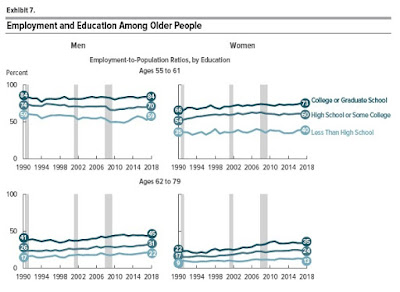Americans are living longer, and also are more likely to be working in their 60s and 70s. The Congressional Budget Office provides an overview of some patterns in "Employment of People Ages 55 to 79" (September 2019). CBO writes:
"Between 1970 and the mid-1990s, the share of people ages 55 to 79 who were employed—that is, their employment-to-population ratio—dropped, owing particularly to men’s experiences. In contrast, the increase that began in the mid-1990s and continued until the 2007–2009 recession resulted from increases in the employment of both men and women. During that recession, the employment-to-population ratio for the age group overall fell, and the participation rate stabilized—with the gap indicating increased difficulty in finding work. The ensuing gradual convergence of the two measures reflects the slow recovery from the recession. The fall in the employment of men before the mid-1990s, research suggests, resulted partly from an increase in the generosity of Social Security benefits and pension plans, the introduction of Medicare, a decline in the opportunities for less-skilled workers, and the growth of the disability insurance system. Although those factors probably also affected women, the influence was not enough to offset the large increase in the employment of women of the baby-boom generation relative to those of the previous generation, most of whom were not employed."

Here are some underlying factors may help in understanding this pattern. If one breaks down the work of the elderly by male/female and by age groups, then it becomes clear that while men ages 55-61 are not more likely to be working, the other groups are. An underlying reason here is that women who are now ages 55 and older were more likely to be in the (paid) workforce earlier in life than women who were 55 and older back in 1990. Thus, part of the rise in work of older women just reflects more work earlier in life, carried over to later in life.

One possible reason for people working older in life can be linked to rising levels of education: that is, people with more education are more likely to have jobs that are better paid and involve less physical stress, and thus more likely to keep working. However, it's interesting that the rise in employment share for males ages 62-79 is about the same in percentage point terms for different levels of education; for females, the increase in employment share for this age group is substantially higher for those with higher levels of education.

There's an interesting set of questions about whether working longer in life should be viewed a good thing. If the increase is due to those have jobs that they find interesting or rewarding and who want to continue working, then that seems positive. However, it's tempting to feel that if people who had their jobs but work longer primarily just because they need or want the money, and they would otherwise be financially insecure, then working longer in life is potentially more troublesome.
From this perspective, one might argue that it would be more troubling if the rise in employment among the elderly was concentrated in those with lower education levels --who on average may have less desirable jobs. But if the rise in employment among the elderly is either distributed evenly across education groups (males) or happens more among the more-educated (females), then it's harder to make the case that the bulk of this higher work among the elderly is happening because of low-skilled workers taking crappy jobs under financial pressure.
It's also true that the share of older people reporting that their health is "very good/excellent" has been rising in the last two decades, and the share reporting only "good" has been rising too. Conversely, the share reporting that their health is "fair/poor" has been falling for both males and females. Again, this pattern suggests that some of the additional work of the elderly is happening because a greater share of the elderly feel more able to do it.
One other change worth mentioning is that Social Security rules have evolved in a way that allows people to keep working after 65 and still receive at least some benefits. The CBO explains:
"Changes in Social Security policy that relate to the retirement earnings test (RET) have made working in one’s 60s more attractive. The RET specifies an age, an earnings threshold, and a withholding rate: If a Social Security claimant is younger than that age and has earnings higher than the specified threshold, some or all of his or her retirement benefits are temporarily withheld. Those withheld benefits are at least partially credited back in later years. Over time, the government has gradually made the RET less stringent by raising earnings thresholds, lowering withholding rates, and exempting certain age groups. For instance, in the early 1980s, the oldest age at which earnings were subject to the RET was reduced from 71 to 69, and in 2000, that age was further lowered to the FRA. (In 2000, the FRA was 65, and it rose to 66 by 2018.) Lowering the oldest age at which earnings are subject to the RET allowed more people to claim their full Social Security benefits while they continued working."
The question of how long in life life someone "should" work seems to me an intensely personal decision, but a decision that will be influenced by health, job options, pay, Social Security rules, rules about accessing retirement accounts and pensions, and more. But broadly speaking, it seems right to me that as Americans live longer and healthier, a larger share of them should be remaining in the workforce. The pattern of more elderly people working is also good news for the financial health of Social Security and the broader health of the US economy.
A version of this article first appeared on Conversable Economist.






Leave your comments
Post comment as a guest